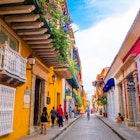
A seahorse biologist has won the world’s top animal conservation award
Sponsored by
May 12, 2020 • 2 min read

Dr. Amanda Vincent co-founded Project Seahorse, which is committed to sustainable use of coastal marine ecosystems. © Amanda Vincent / Project Seahorse
A seahorse biologist has been chosen as the recipient of the world’s top animal conservation award for 2020, having dedicated her life and career to understanding and advocating for seahorses, as well as working on a wide range of marine conservation issues.
Dr. Amanda Vincent is the first marine conservationist to win the Indianapolis Prize, which recognizes and rewards conservationists who have achieved major victories in advancing the sustainability of an animal species or group of species. A professor at the Institute for the Oceans and Fisheries at The University of British Columbia, she receives the unrestricted $250,000 prize that has been awarded by the Indianapolis Zoological Society, Inc. every second year since 2006.

Amanda directs Project Seahorse, and was the first biologist to study seahorses in the wild and establish a project for their conservation. She was initially drawn to research their extraordinary biology, where only males become pregnant and some species are monogamous. But she soon discovered the threats they faced. These include harmful fishing practices such as bottom trawling, where industrial nets are dragged across the ocean floor, destroying vital habitats such as coral reefs, mangroves and seagrass beds in the process.
Her achievements include successfully lobbying the global conservation community to include seahorses on the International Union for the Conservation of Nature’s Red List, and playing an instrumental role in persuading the United Nations Convention on International Trade in Endangered Species of Wild Fauna and Flora to adopt landmark legislation to regulate the global seahorse trade. After discovering the overfishing of seahorses for use in traditional medicines, aquariums, displays and souvenirs, she also partnered with local communities, industry groups, aquariums and governments around the world to develop sustainable approaches to seahorse trade.

As a result of Amanda’s relentless advocacy and efforts, 35 marine protected areas have been established where fishing is forbidden and populations of seahorses and other marine fish, such as sharks, rays, groupers and eels, can thrive. “Dr. Amanda Vincent’s determination to protect our oceans and the species that inhabit it is nothing short of heroic,” says Dr. Rob Shumaker, president and CEO of the Indianapolis Zoological Society, Inc.
Amanda is the eighth winner of the Indianapolis Prize, which is selected by a nine-person jury. Five finalists—Dr. P. Dee Boersma, Dr. Christophe Boesch, Dr. Gerardo Ceballos, Dr. Sylvia Earle and Dr. John Robinson—receive $10,000 each.
To learn more about the award and previous prizewinners, please visit the Indianapolis Prize website here.
Sponsored by Indianapolis Prize
As a travel entertainment and inspirational media outlet, we sometimes incorporate brand sponsors into our efforts. This activity is clearly labeled across our platforms.
This story was crafted collaboratively between Indianapolis Prize and Lonely Planet. Both parties provided research and curated content to produce this story. We disclose when information isn’t ours.
With sponsored content, both Lonely Planet and our brand partners have specific responsibilities:
Brand partner
Determines the concept, provides briefing, research material, and may provide feedback.
Lonely Planet
We provide expertise, firsthand insights, and verify with third-party sources when needed.
Explore related stories








 Destination PracticalitiesThe best times to visit Jackson Hole, Wyoming, through the year
Destination PracticalitiesThe best times to visit Jackson Hole, Wyoming, through the yearNov 16, 2024 • 6 min read
 Destination PracticalitiesHere are 12 top things to know before you visit Minneapolis
Destination PracticalitiesHere are 12 top things to know before you visit MinneapolisNov 15, 2024 • 9 min read
